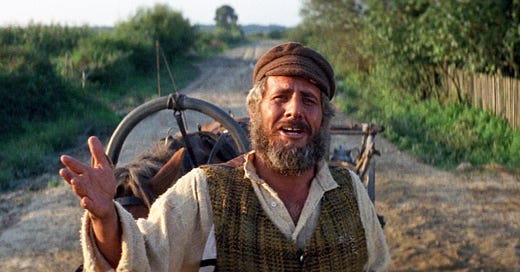Smaller Dose #13: It’s good that you came back for more.
Reading time: ~2 minutes
Length: ~450 words
So here we go…..
“Fiddler On the Roof” is one of my favorite stories. In the Pale of Settlement of Imperial Russia around 1905, a Jewish peasant with traditional values contends with marrying off his daughters while growing anti-Semitic sentiment threatens his village. If you haven’t seen the movie, I highly recommend it.
There are many life lessons that one can take away from the story, some of which are highly relevant at this time in our history. At several points throughout the story, Tevye (a simple dairyman and the main character), quotes (actually misquotes) “The Good Book.”
Here is one exchange:
Tevye:
As the good book says, when a poor man eats a chicken, one of them is sick.Mendel:
Where does the book say that?Tevye:
Well, it doesn't say that exactly, but somewhere there is something about a chicken.
And one of my favorites:
“As the Good Book says, good news will stay. And bad news will refuse to leave.”
These are Tevye’s attempts at making a point by assigning authority regardless of the source and perhaps showing his wit and quick tongue. And oftentimes we find that these attributions linger and stick with us for a bit longer. Some of these phrases have stayed with me for many years.
Why?
The element of credibility comes to mind. When we state something and then attribute it to a trusted source, it sticks. It has the illusion of credibility. But did we actually take the time to authenticate the source and check for validity or truthfulness? Most likely, not. Who has time for that?
This is where we find so many of us guilty of quoting or misquoting something to serve a purpose and make a point. True or not, when we quote or misquote something, even when there is positive intent, we are putting our credibility at risk.
Here's an example:
“Don’t believe everything you read on the internet.” – Abraham Lincoln (16th President of The United States, 1809 – 1861)
A harmless example. A good point. A great life lesson. But obviously not stated by someone who died more than a century before the internet was in the realm of possibilities.
So, consider this:
Where are you repeating things, you’ve heard or read?
Where in your life are you making claims without verifying first?
What is the risk of sharing and spreading information that may or may not be true or accurate?
And where can you be more like Mendel in the dialogue above, and ask good questions and appropriately challenge “The Good Book” or any other source?
In closing, I’ll channel my inner Tevye:
As the Good Book says, “Trust, but verify.”
Jerry is the author of “Small Doses: Common Sense to Common Practice,” a book which contains 18 thought pieces about the intersection of Process Improvement, Leadership and Life. Jerry also writes short stories about life experiences (Anchor Points) and the profound lessons that can be learned from before and after those moments.
Still looking for ideas for stocking stuffers and simple gifts for friends and colleagues? The holiday season here. Books make great gifts that can be enjoyed, shared and promote discussion and the exchange of thoughts and ideas. My book might even reduce the amount of tension and family arguments this year and beyond. Consider purchasing my book, Small Doses: Common Sense to Common Practice as a gift for anyone on your list. Only $14.99 for paperback and $9.99 for the Kindle version. Get yours today by using the link below. You’ll thank me later.
If you would like to make a contribution to support my work, click on the link below:


